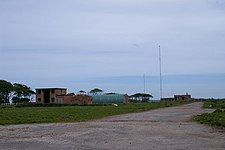| This article needs additional citations for verification. Please help improve this article by adding citations to reliable sources. Unsourced material may be challenged and removed. Find sources: "RNAS Rattray" – news · newspapers · books · scholar · JSTOR (May 2016) (Learn how and when to remove this message) |
| RNAS Rattray (HMS Merganser) | |||||||||||||
|---|---|---|---|---|---|---|---|---|---|---|---|---|---|
| Crimond, Aberdeenshire in Scotland | |||||||||||||
 View of the airfield View of the airfield | |||||||||||||
 | |||||||||||||
| Coordinates | 57°36′44″N 01°53′01″W / 57.61222°N 1.88361°W / 57.61222; -1.88361 | ||||||||||||
| Type | Royal Naval Air Station | ||||||||||||
| Site information | |||||||||||||
| Owner | Ministry of Defence | ||||||||||||
| Operator | Royal Navy | ||||||||||||
| Site history | |||||||||||||
| Built | March 1943 (1943) | ||||||||||||
| In use | July 1943-present | ||||||||||||
| Airfield information | |||||||||||||
| Elevation | 13 metres (43 ft) AMSL | ||||||||||||
| |||||||||||||
| Commissioned | 3 October 1944 | ||||||||||||
Royal Navy Air Station Rattray, (RNAS Rattray; or HMS Merganser) and also known as Crimond Airfield, Crimond Aerodrome or Rattray Aerodrome was a Royal Naval Air Station near Crimond, Aberdeenshire.
History
The station started to be built from March 1943, with 774 Naval Air Squadron moving in from July 1943 for Telegraphist Air Gunners training but the site was not commissioned until 3 October 1944.
The base then switched to training Torpedo Bombing Reconnaissance crews.
The following units were here at some point:
- 708 Naval Air Squadron:
- 714 Naval Air Squadron (May 1944-unknown)
- 717 Naval Air Squadron (November 1944-unknown)
- 753 Naval Air Squadron
- 766 Naval Air Squadron
- 769 Naval Air Squadron
- 774 Naval Air Squadron (July 1943-August 1945)
- 815 Naval Air Squadron
- 817 Naval Air Squadron
- 818 Naval Air Squadron
- 821 Naval Air Squadron
- 825 Naval Air Squadron
The base was closed in 1946, being moved into a state of care & maintenance. It was also used as a Royal Naval Wireless Station until 2004.
Current use
The site is home to a high frequency transmitter station forming part of the Defence High Frequency Communications Service. The station is operated by Babcock International Group on behalf of the Ministry of Defence.
See also
- List of air stations of the Royal Navy
- 24 February – Royal Navy submarine HMS Vandal is lost with all 37 crew on sea trials in the Sound of Bute; she would not be located until 1994.
- 27 March – Royal Navy escort carrier HMS Dasher (D37) is destroyed by an accidental explosion in the Firth of Clyde, killing 379 of the crew of 528.
- 30 May – Royal Navy submarine HMS Untamed (P58) is lost with all hands on a training exercise in the Firth of Clyde.
- 30 November – HMS Vanguard (23) is launched at John Brown & Company's shipyard at Clydebank by the Princess Elizabeth. The Royal Navy's largest, fastest and last battleship, she was laid down in October 1941 and will be in commission from 1946-60.
References
Citations
- ^ "HMS Merganser / RNAS Crimond / RNAS Rattray / RNAS Rattray Head". Airfields of Britain Conservation Trust. Retrieved 25 May 2016.
- ^ Smith 1983, p. 177.
- "Defence High Frequency Communications Service" (PDF). High Frequency Industry Association. Babcock International Group. 5 September 2012. Archived from the original (PDF) on 1 October 2017. Retrieved 1 October 2017.
- MacKinnon, Angus (2010). "The Loss of HM Submarine Vandal (P64) off the Isle of Arran in 1943". ClydeMaritime. Retrieved 24 February 2018.
- "HMS/M Vandal: Inchmarnock Water, Sound Of Bute, Firth Of Clyde". Canmore. Edinburgh: Historic Environment Scotland. 2011. Retrieved 24 February 2018.
- McCart, Neil (2001). HMS Vanguard 1944–1960: Britain's Last Battleship. Liskeard, Cornwall: Maritime Books. ISBN 0-907771-83-1.
Bibliography
- Smith, D J (1983). Action Stations: Vol 7. Military airfields of Scotland, the North-East and Northern Ireland. Cambridge: Patrick Stephens Limited. ISBN 0-85059-563-0.